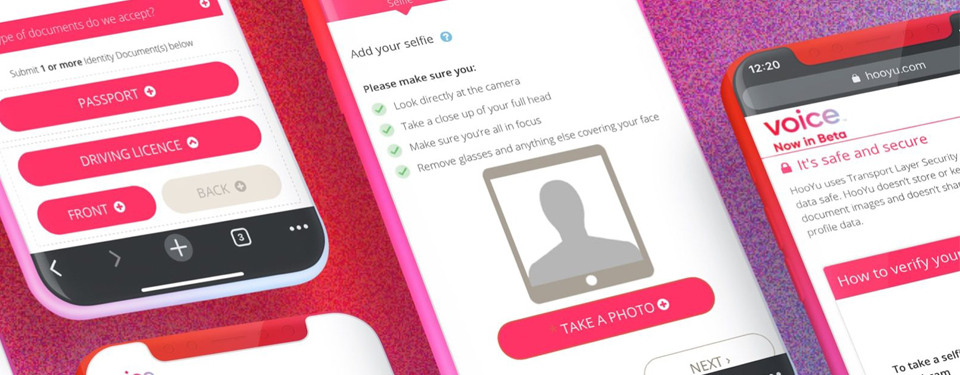Fake news? Trolling celebrities? Bullying? Spam? Trust online?
These are the growing pains of the digital world and sadly, they come with serious real-life consequences in the real world. At root, they are enabled by one issue…anonymity in social media.
One of our clients, Voice.com, a leading light in the crypto and blockchain world, is launching a new social media platform and has taken a stand. Their mission is to create a social platform free from bots and fake accounts, where transparency and integrity rule. In this blog post, we examine why KYC is needed in social media and how other industries have made KYC a standard business practice.
Being able to remain anonymous on social media accounts is undermining social platforms, enabling spam, fuelling fake news, and hiding the identity of those who like to threaten or bully people online, commit fraud and spread disinformation.
In 2019, Facebook closed down over 5 billion fake accounts and removed millions of posts[1]. These fake accounts aren’t just junk ads for cheap sunglasses but are often attempting to harvest people’s information, install malware, or spread hate speech across the platform.
To be fair to social platforms, they are increasingly policed and when/if malicious content is identified, it is taken down and the profile removed. Sadly, whoever was behind that profile is able to quickly and easily create a new one and resume their nefarious activities without so much as a tea break. Whilst there are laws against fake advertising, making threats, hate speech etc, it’s impossible to hold people to account if you don’t know who they are.
Who’s been through the growing pains already?
Industries that have already been through these growing pains have successfully balanced the twin demands of KYC and the customer experience and have emerged all the stronger for it.
With the likes of mainstream banks like NatWest or challenger banks like Bo, you can open a bank account with your mobile phone at any time of the day from the comfort of your sofa. Oh, and guess what, they perform KYC on you in real-time so they know who their users are.
If you want to go and gamble online with somebody like Betfred or Tombola, you can sign-up and deposit and gamble in seconds, and again, guess what, these gambling operators quickly verify your age and identity.
What does popular opinion say?
There now seems to be a groundswell of opinion to stamp out abuse from social media platforms. After his team mate received racial abuse over social media, Premier League football star Harry Maguire recently took directly to social media to issue a call for social media firms to verify accounts with users’ passports to stop racist online abuse.
25,000 retweets and 148,000 likes later and British MP’s followed suit by asking for social media firms to unmask racist trolls by verifying accounts.[2]
That lack of accountability is driving new legislation as the UK government looks to appoint Ofcom to regulate illegal and harmful content on social media sites, making sure that they remove harmful posts and enforce their terms and conditions.[3] Those terms and conditions include the removal of “fake” profiles.
So how can identity verification, or to put it in industry parlance, KYC (Know Your Customer) solve these social media woes?
Being able to prove who we are in the digital world is something that has become second nature. KYC in the context of gambling is a protection designed to look after the user, the same could also be said for social media to protect underage users from adult messaging and content.
If Mark Zuckerberg was launching Facebook now, he would most likely implement a KYC solution into the account opening process. If today’s KYC technology had existed when the Zuck coded thefacebook from his Harvard dorm, it would have prevented those that thrive on its anonymity from causing such damage. In fact, when Facebook first launched you could only join with a university email address, this in itself was a rudimentary form of KYC.
The fact is, “social” media is exactly that, a place where we can be social, share our lives, learn about the world, update our friends and family, and discuss our thoughts and opinions. Social media is not a stage for anonymous entities to spread misinformation, hatred or lies.
Simple KYC checks at registration can only enhance the digital world and improve the social media experience, removing those who seek to use it for the wrong reasons and giving confidence to those that are using it that they are in a safe environment talking to real people and know who they’re dealing with.
At HooYu, we’re experts in KYC and customer onboarding and our clients such as NatWest and Betfred turn to us to help them curate an account opening process that helps their customers glide through KYC.
Don’t take our word for it though, here’s what Voice.com have to say on the matter of KYC https://voice.com/blog/why-kyc-matters/ and why anonymity is no longer part of the modern social media experience.
[1] https://edition.cnn.com/2019/11/13/tech/facebook-fake-accounts/index.html
[3] https://www.theguardian.com/media/2020/feb/12/what-powers-ofcom-have-regulate-internet-uk


